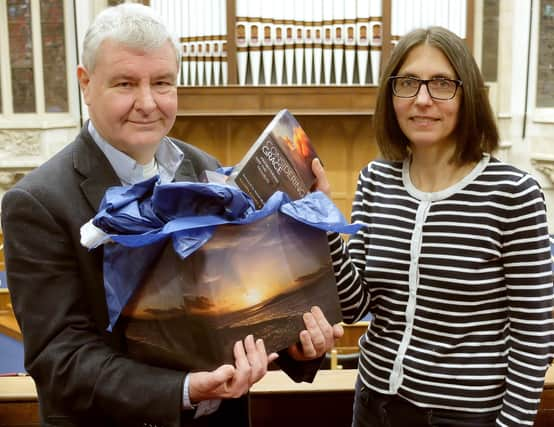Conference set to ‘unpack the impact’ of Troubles book


Considering Grace, which had its Mid and East Antrim launch in November, captures a range of experiences of the Troubles of people from a Presbyterian background.
Those featured include ministers, victims, members of the security forces, emergency responders, healthcare works and ‘critical friends’ of the Presbyterian tradition.
Advertisement
Hide AdAdvertisement
Hide AdThe conference, which is free to register and attend, is to be held on Friday, March 20, in Assembly Buildings, Belfast. Entitled ‘Considering Grace – unpacking the impact’, it will continue to explore the key aims of the book, promote healing and forgiveness within PCI congregations and contribute to wider discussion on dealing with the past.
The conference will welcome back to Belfast Canon David Porter, chief of staff to the Archbishop of Canterbury. In his address, he will look at the impact of the book for wider society.
Considering Grace also raises a number of challenges for ministry and witness in PCI itself. The Very Rev Professor Stafford Carson, principal of Union Theological College, will unpack the impact of the book in this context.
Looking forward to the event, Rev Tony Davidson, minister of First Armagh Presbyterian Church, and convener of PCI’s Dealing with the Past Task Group, which has led the Considering Grace project, said, “When we began this initiative nearly four years ago, our aim was to tell a wider story than had been available to date. We wanted to acknowledge both what is good, but also to reflect upon the times when Presbyterians failed to be faithful peacemakers.
Advertisement
Hide AdAdvertisement
Hide Ad“With the UK Government’s proposals on legacy due to be published after Easter, it is our hope that the book and this conference will contribute, over the longer term, to an important wider discussion on dealing with the past, reconciliation and forgiveness. If we are to move on as a society, this is essential.”
Mr Davidson said the conference has huge implications for Presbyterians. It will also have wider relevance for other denominations and those working on initiatives that help to address the legacy of the past.
“We are very much looking forward to welcoming our principal speakers and hearing their insights. There will also be roundtable discussions and a panel, which will include Dr Gladys Ganiel, the book’s co-author, and Dr Nicola Brady, general secretary of the Irish Council of Churches, as well as the principal speakers. The launch of a resource for congregations and a resource for trainee ministers will ensure that the conversations continue long after the conference has ended,” Mr Davidson added.
Dr Ganiel, a sociologist at Queen’s University, Belfast and Research Fellow at the Mitchell Institute, encouraged people to attend.
Advertisement
Hide AdAdvertisement
Hide Ad“Considering Grace contributes to the historical record of people’s experiences during the Troubles, but it is foremost a book about the future and so is this month’s conference.
“Two decades on from the Belfast/Good Friday Agreement, a generation has grown up without the day-to-day lived experience of the conflict, and for that we are all thankful. But they have grown up in a society that is still affected by its past and has yet to find a way of addressing it.
“In our research for the book we found an eagerness, of so-called ‘ordinary’ people, to talk about forgiveness, although the views expressed were complex and varied. However, I think this signals that there is a societal need to open a conversation about forgiveness, and its related virtues such as mercy, grace and hope. I hope both the book and the conference can contribute to that dialogue,” Dr Ganiel said.
To encourage that dialogue within congregations a small group study resource called ‘Considering Grace: A study guide for all’ will also be launched at the conference. A resource for trainee ministers has also been developed.
The conference will take place on Friday, March 20, 10am-1.30pm, in Assembly Buildings, Fisherwick Place, Belfast. To book visit www.presbyterianireland.org/Events